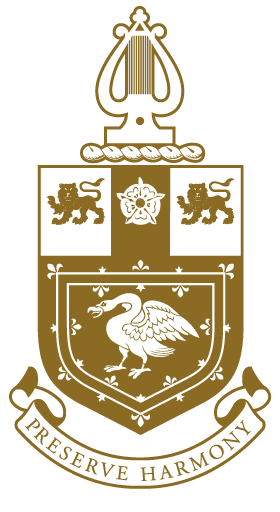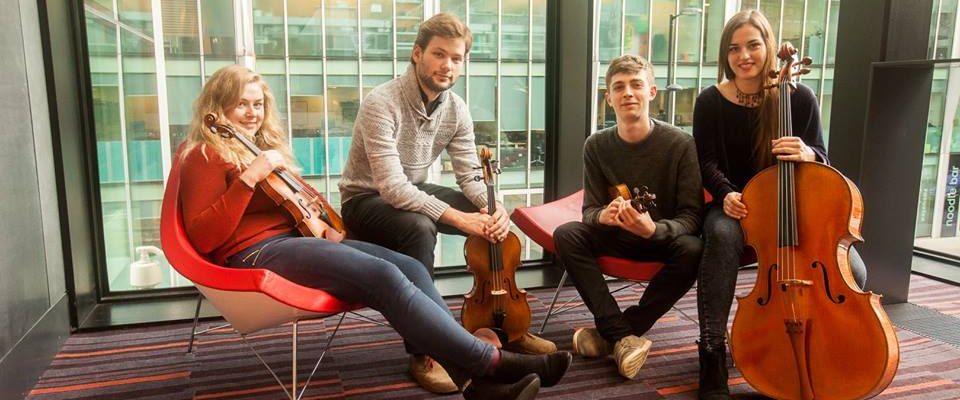Young Artist Interview: Claire Wickes – Singing the praises of opera
Musicians’ Company Yeoman Claire Wickes is Principal Flute of the English National Opera (ENO), a role she has held since graduating from the RCM. Away from the pit, Claire also teaches, delivers outreach in hospitals, and performs reimagined interpretations of traditional works as part of Siren duo with harpist Tomos Xerri. Here she tells the Company about her love for opera, what makes the ENO special and why she looks miserable playing the flute!
I knew little about opera and had only ever seen one performance in my life before my trial for the ENO principal flute position – I was still studying at the RCM and, like many, I didn’t think opera was for me. I was state-educated, from a family without any musical background, and I had the impression that opera was exclusively for well-heeled intellectuals that dressed up in eye-wateringly expensive clothes to enjoy epic Wagner operas. How wrong could I have been!
While historically opera has had an ‘elitist’ reputation, it’s now undoubtedly one of the most affordable and incredible nights out you can have. Dress up or dress down, and pay as little as £12 for a seat. There really are no barriers to going to the opera anymore and nothing equals the emotional force of this art form, which is why I’ve become something of an opera missionary, singing the ENO’s praises and inviting friends along who wouldn’t have thought it was their scene (they always come back for more!). The ENO itself fosters some amazing collaborations with a wide range of organisations and online influencers such as The Guilty Feminist, who recently came in to do a comedy podcast at the Coliseum; it’s things like this that show new audiences that they’re welcome and help to widen opera’s appeal.
Watching opera continually evolve into something everyone can enjoy, not just those with deep pockets, is something I feel passionate about. I always knew I wanted to play the flute in an orchestra, but never once considered how important it was to work for an organisation that fits my ideology. The ENO fits mine to a T. Encouraging diversity and having audiences of every age and background often results in shows being interpreted and appreciated differently, and we get some pretty varied feedback. We recently put on a new production of Richard Strauss’ Salome, directed by Adena Jacobs with an all-female creative team, and in the famous Dance of the Seven Veils there were backing dancers twerking. Critics weren’t convinced, but the younger audiences that came to watch the show loved it – the teenagers that came with schools thought it was scandalous, and most importantly, relevant to them! I don’t see why the opinions of those young people should be any less valid than those of someone who writes an arts column! It also helps that ENO productions, except those that aren’t designed to be conventionally understood (such as parts of operas by Phillip Glass which are in ancient languages like Sanskrit), are in English – it helps to make performances feel less exclusive and easier for everyone to relate to.
State schools are invited to watch every dress rehearsal through ENO’s Baylis in the Balcony programme. It’s a great chance to expose young people to the magic of opera, and well, if you can enthuse a group of teens about 100-year-old classical music for three hours, you know you’re doing something right! Often the schoolchildren get so engrossed in the performance they’ll sit quietly gripped throughout the performance, then over-zealously applaud at the end, often having to be told by their teachers to calm down! On the rare occasion I’m not performing, I’ll also go and see a show – you can’t see anything from where I sit in the pit, so I’m often completely in the dark about what’s going on on-stage. Most recently I saw Gershwin’s Porgy and Bess, and having already played it about 12 times you’d think some of the emotional impact would’ve worn off. I was so moved by the sound and energy on stage. The 40-voice chorus of exclusively BAME singers (assembled for this production as per Gershwin’s original instructions) were phenomenal – so emotionally charged and thrilling to watch.
I’m only too aware of how important positive early exposure to these things is, if you want to encourage life-long interest. I wouldn’t be where I am today without a string of inspiring teachers, from my school flute teacher, Carolyn Kelly, to my teachers Katherine Baker (Principal Flautist at the Royal Opera House – just down the road from me in Covent Garden), Daniel Pailthorpe (BBCSO) and Gareth Davies (LSO). Whilst I was at Oxford University I was lucky enough to study with Michael Cox, who inspired me to keep practising – even when I had two or three weekly essays to write. Despite the academic pressure of my music course, I would practise diligently for two hours a day – no more, no less – often at 1 am, hunched over a little electric radiator in the shed-like building attached to my student halls to avoid waking my flatmates!
This discipline has put me in good stead, and I’ve also been forced to become more efficient with my time since joining the ENO. The orchestra have to learn the music quickly and independently, and be able to turn up at our first rehearsal knowing our parts close to a performance standard. It’s crucial to learn how to practise efficiently; the lifestyle of being a professional orchestral musician is so hectic that there’s simply not the time to practise for hours and hours a day. I’ve recently been sharing some of these practise techniques on the online platform Principal Chairs. I myself used this platform when I was a student – it features video masterclasses of orchestral excerpts from principal flautists of orchestras – so it was slightly surreal for me being on the other side of the camera!
Away from the orchestra I also perform as half of the flute & harp duo Siren with harpist Tomos Xerri and do some outreach work in hospitals and schools, which I love. I was once demonstrating the flute to a group of young schoolchildren and asked if they had any questions. One kid, desperately straining her arm to be chosen, asked ‘why do you look so miserable when you play the flute?!’ I had to convince her I actually feel really happy when I play, it’s just the way making a flute embouchure makes my face look!
If I could change one thing about working at the ENO it would be the inevitable long and anti-social hours – productions usually finish around 10.30 pm. I’m playing in three different shows this week, with a couple of performances of each, and next week it’ll be the same. It’s a small price to pay for doing something I love, but I do find myself hitting the sack in the small hours. The biggest challenge was having to work during the final of The Great British Bake Off – I had to avoid all news and social media for fear of spoilers!
You can find out more about Claire on her ENO artist page and on twitter @claire_wickes
Interview by @suzywillmott





